Why Do Some Pigeons Have No Feet?
Pigeons, like other birds, heavily rely on their feet for multiple tasks. But you may encounter a group of squabs and wonder why do some pigeons have no feet. Is this a natural anomaly?
No, pigeons may lose their feet when their toes are entangled with human hair, suffer some sort of injury, get infected with bacteria or some sort of disease, or suffer from chemical reactions.
The primary reason for pigeon losing their feet is human hair. When pigeons walk over human hair and that said hair gets entangled in their legs, they can prevent blood circulation on the toes, leading it to fall off.
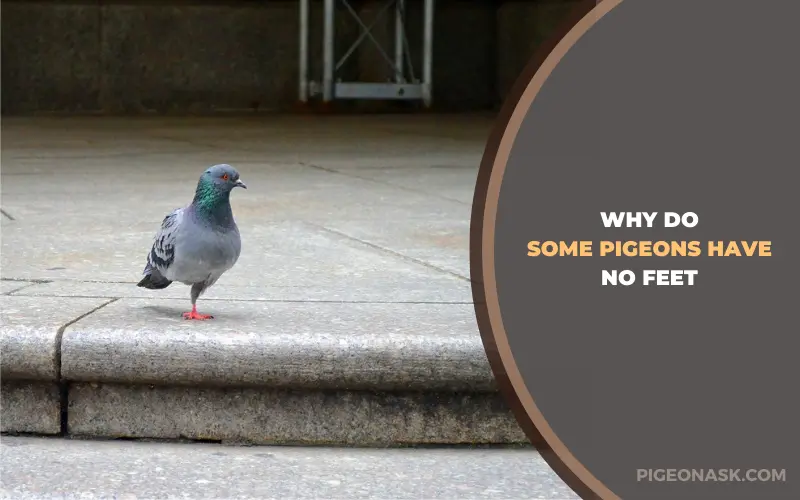
Along with string feet, there are multiple factors that lead pigeons to have bad feet and ultimately lose this part of their body. Keep reading if you want to learn more about this issue and how to take care of it.
Want to learn more about pigeon blogs:
Why Do Pigeons Always Have Bad Feet?
Bad feet can lead pigeons to lose their feet faster as it invites diseases and makes the flesh more vulnerable. Pigeons, especially ones in urban areas, then you will see that they always have bad feet.
But don’t think pigeons deliberately make their feet bad. No, there are quite a few reasons behind this; some of the most common ones are –
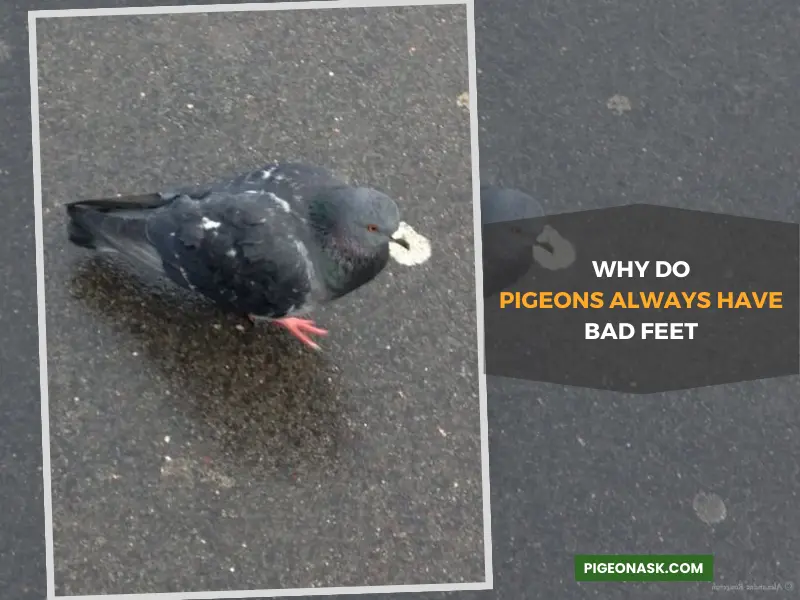
01. Improper Environment
Urbanization isn’t something that goes perfectly for pigeons to thrive in. The urban environment is filled with dust, dirt, and chemicals, all of which we humans are to blame for.
When their feet come in contact with these, the feet can go bad. Also, in urban settings, pigeons may have to pick up food scraps from hazardous areas filled with broken glass and litter; this can also lead to damage to the feet.
There aren’t many ledges and tree branches for pigeons to perch from in urban areas as well. So, if they are perching from an uncomfortable position, then it may also lead to foot damage.
02. Fighting for Survival
If there is a lack of resources, then pigeons will fight for food among themselves.
The same goes for defending themselves from predator attacks. This can lead to injuries primarily focused on their feet.
03. Not Enough Veterinary Care
Unlike domestic animals, it isn’t possible to take care of wild pigeons. Therefore, those suffering from any infection or disease aren’t cured, which can spread from one pigeon to another.
That is why most pigeons you might encounter in the wild can have bad feet.
What Is the Disease in Pigeon Feet?
As mentioned earlier, one of the main causes of pigeons having no feet is disease and infections. The most common disease that affects the feet the most is called bumblefoot.
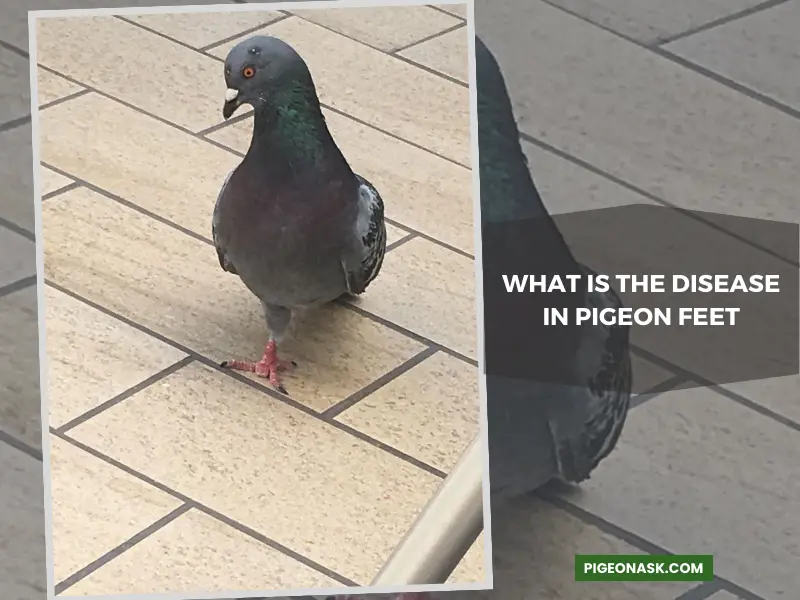
In medical terms, bumblefoot is a type of bacterial inflammation that results in swelling and painful pus-filled abscesses at the bottom of the foot of birds.
Pigeons can also suffer from foot infections if their foot comes in contact with harmful chemicals. Both the bumblefoot disease and chemical infection enter the foot through cuts and injuries a pigeon receives in that location.
How to Care for a Footless Pigeon?
If you come across a pigeon without feet and want to take care of it, then there are several things that you will have to consider.
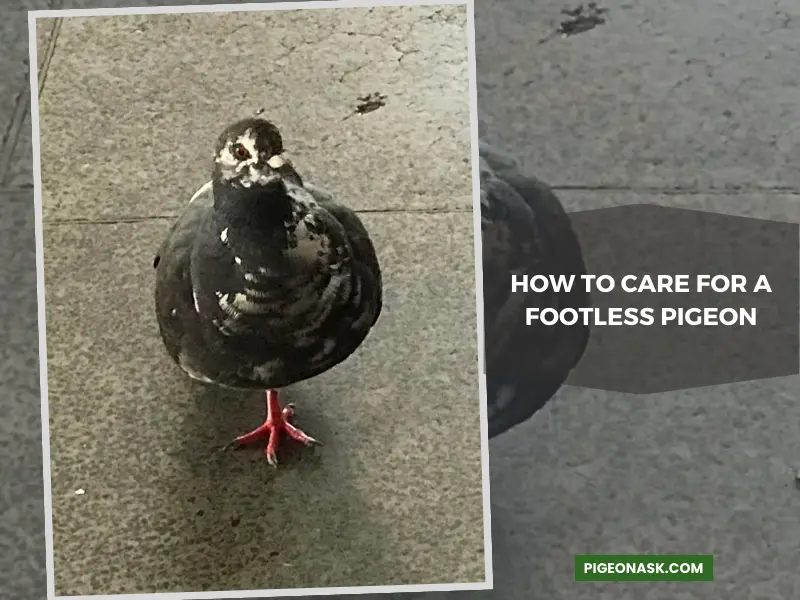
01. Examine the Bird, Consult a Professional If Possible
First things first, see how the pigeon is faring. Unless it has recently lost its foot, the bird will develop certain behavioral and physical traits that will allow it to survive in the wild.
Also, find out if the damage received is only on the foot or on other parts of the body as well. Here, consulting a veterinarian becomes handy as they will be able to identify any issues and offer the best suggestions for the bird’s survival.
02. Provide a Safe and Comfortable Home
The foot of a pigeon tackles most of the harsh environment the bird has to go through. So, if that isn’t present anymore, then moving around on rough terrain will be very uncomfortable and painful.
So, make sure the nest or sanctuary you are providing the pigeon is soft and comfortable. You will also have to ensure that the bird feels safe. If it feels threatened, then it may further damage its body.
03. Keep the Pigeon Clean and patch Up Any Wounds
Without its foot, pigeons aren’t able to clean their feathers, which plays a pivotal role in their cleanness, flight balance, and overall comfort. So, you will have to take care of that issue by keeping the pigeon clean.
Also, the pigeon is likely to rack up a few wounds around the foot area due to not having feet. See if there is any open wound and clean it as soon as possible.
These wounds can lead to infections and other diseases, so make it your priority to clean them.
04. Provide an Ample Amount of Food
With a disability like not having a foot, a pigeon won’t be able to get as much food as it used to. So, make sure to feed the pigeon properly. Malnourishment is a common feature among pigeons without feet.
05. Ensure Proper Medicine and Care
If you don’t want the pigeon to develop any diseases, then you must give it medicine to repair some of the damages that come along with being footless.
For this, you will have to seek professional help and provide the pigeon with medicines and a care guide that the expert suggests. Regular vet check-ups will become a part of your life if you wish to care for a footless pigeon.
06. Create Social Interaction Opportunities
Pigeons are highly intelligent social creatures who seek companionship and comfort in groups. So, unless you want the pigeon without a foot to go into a depression spiral, you will have to provide it with a social network.
You can pair the pigeon up with other pigeons who are suffering from the same condition. There is also the option of involving the footless pigeon with perfectly healthy pigeons.
But in that case, you will have to keep the pigeons under heavy surveillance as there is a chance that the odd pigeon might get bullied or hurt itself while interacting with others.
07. Physical Support (Optional)
In some worst cases, the overall movement of the pigeon becomes extremely limited. This can happen to pigeons on the heavier side mostly.
If you encounter something like this, then you may have to provide the pigeon with physical support, like moving it from one location to the other. There are some accessories that may help, but take a doctor’s recommendation beforehand.
Can Pigeon Survive Without Feet?
Similar to how we humans handle the loss of a body part, losing feet doesn’t mean the end of the world for a pigeon.
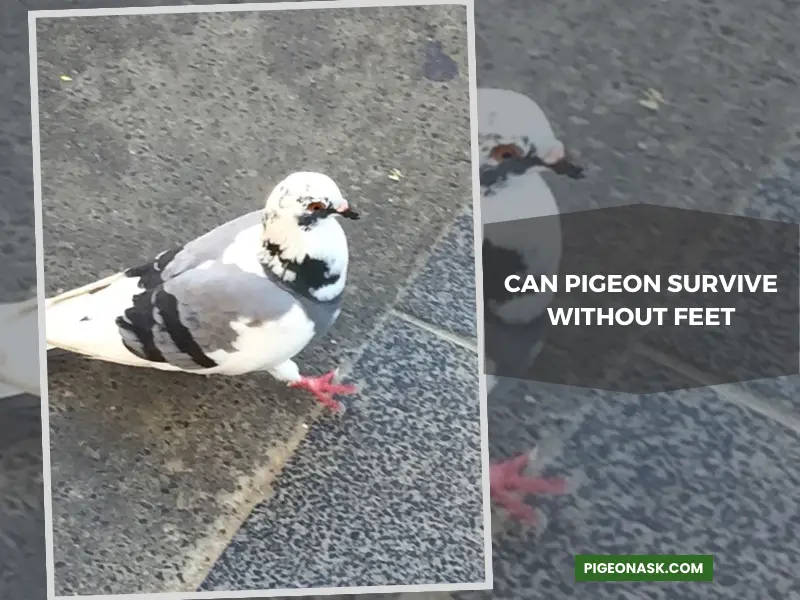
Yes, a pigeon’s life will become extremely difficult without having feet to support, but it will be able to survive if it can adjust to this new situation.
Their movement and mobility will have to evolve, and so will their instinct. Footless pigeons won’t be as fast as they used to be when they had their feet, so survival in the wild becomes highly difficult. But it is doable.
The Effect of Footlessness on Pigeons
When they don’t have their feet to back them up, pigeons lose many essential functions, affecting their daily life. Here are some of the most common effects a footless pigeon faces –
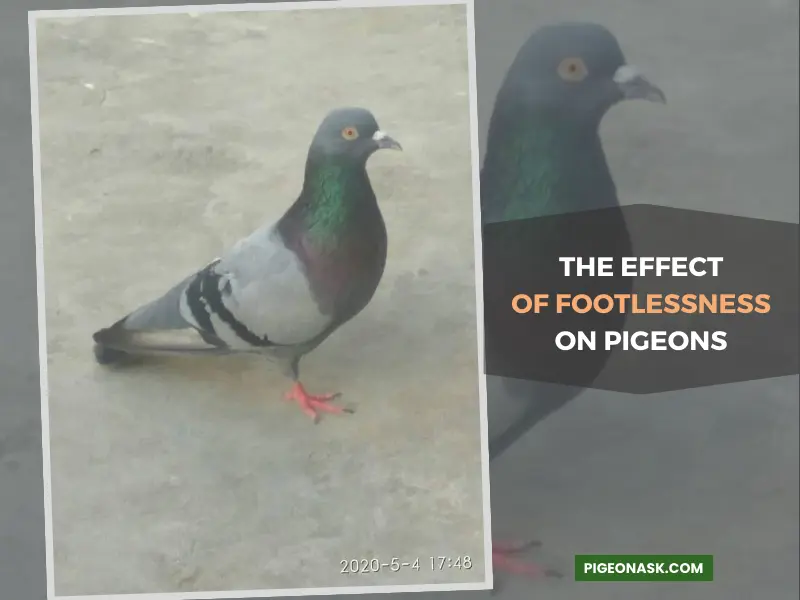
Limited Mobility and Speed
Pigeons can’t walk on the ground properly without their feet. The same goes for hopping. This restricts their mobility significantly. They are also unable to make any fast take-off without their feet.
This makes finding food and water quite difficult. Not to mention, predator avoidance becomes very hard when a pigeon doesn’t have its feet.
Perching Issues
A common trait of pigeons is perching. But without feet, that isn’t possible as they won’t be able to perch in rough spots, and if they force themselves, then the likelihood of getting hurt will just increase.
Difficulty Picking Food
Usually, pigeons will use their feet to pick up food like seeds and grain. They also use their feet to bring the food close to their mouth at times.
When the foot is gone, that is not possible anymore. Thus, it becomes quite difficult for the pigeons to grab and eat their food.
Trouble Balancing
Feet plays an important role when it comes to the balance of a pigeon. Especially when they are in mid-flight, without the feet, they will have difficulty maintaining a steady balance or keeping up a fast-paced chase.
Stress and Depression
Pigeons are social birds, and losing feet can lead them to be isolated from others or feel depressed as they aren’t like the other pigeons in the group anymore. Mating also becomes difficult for these pigeons.
Conclusion
Losing a part of your body is unfortunate and difficult to deal with. Similar to humans and other animals, some pigeons suffer from this in the form of not having feet.
But this doesn’t mean these birds are doomed. If they can receive proper care and medicine, they will be able to overcome most difficulties and lead a healthy life.
If you like this insight into the world of pigeons, make sure to follow us on our Facebook, Pinterest, and Twitter. We provide regular content and would love to hear our feedback!
References:
- https://www.birdspot.co.uk/bird-brain/why-do-so-many-urban-pigeons-have-missing-legs-or-feet
- https://edition.cnn.com/2019/11/14/europe/pigeon-toes-hair-study-scli-intl-scn/index.html
- https://www.theguardian.com/notesandqueries/query/0,5753,-1643,00.html
- https://www.ndtv.com/offbeat/the-hair-raising-reason-why-pigeons-often-lose-their-toes-2132289
